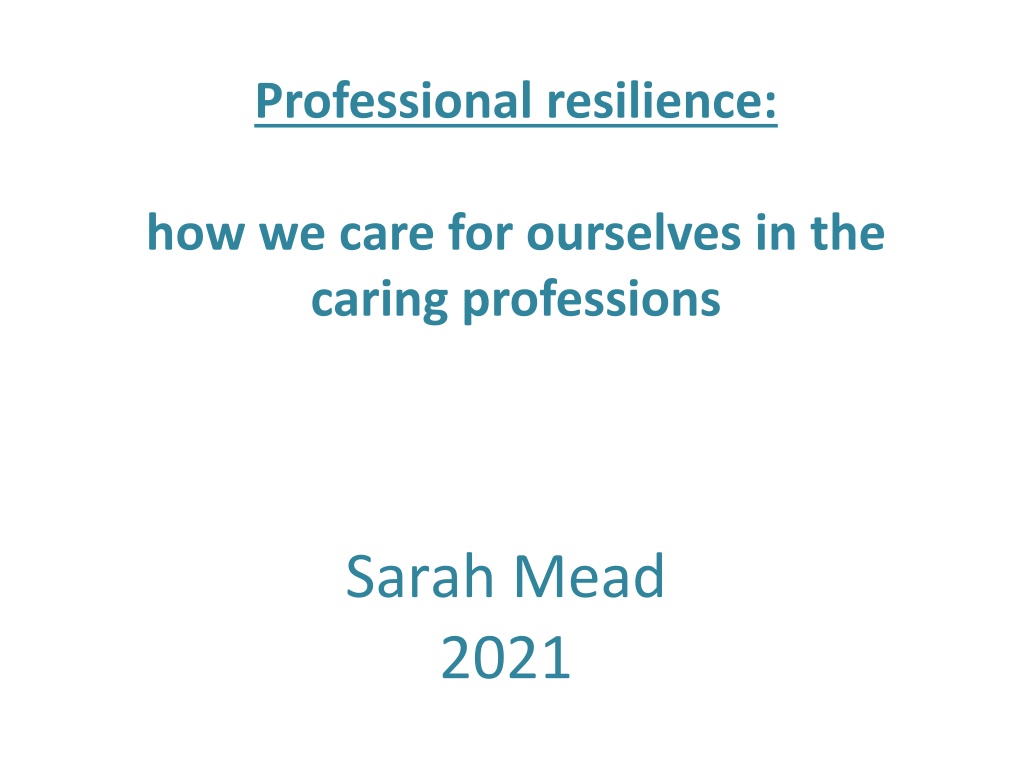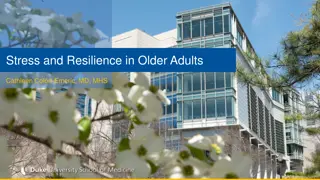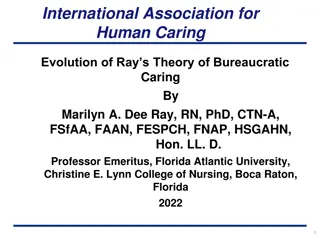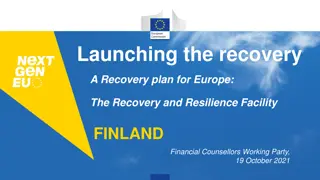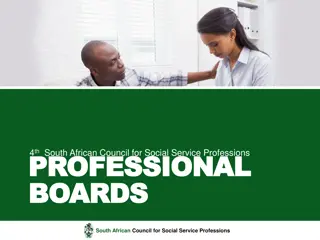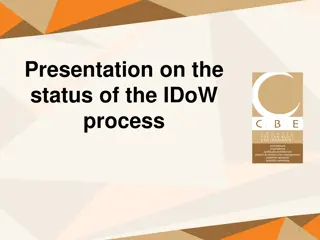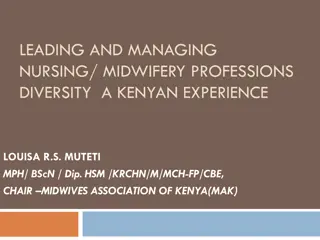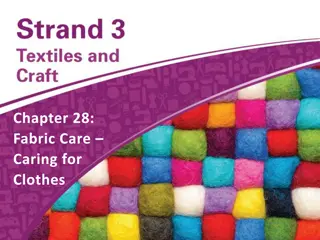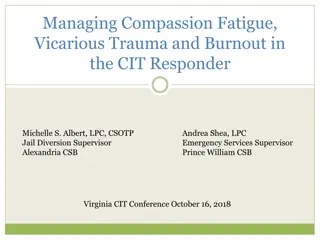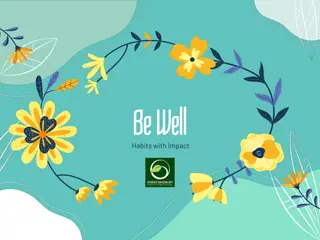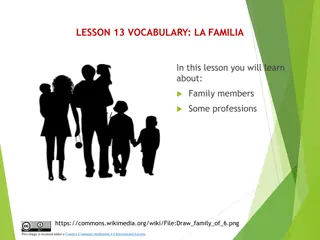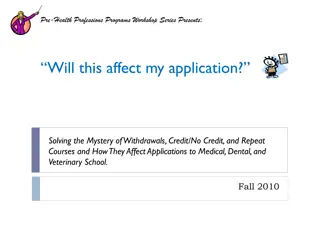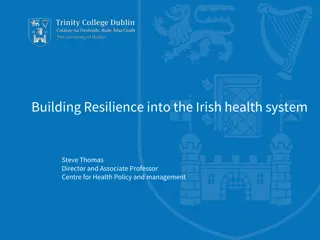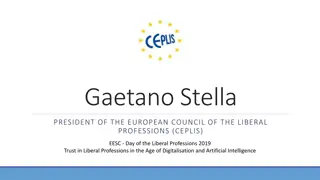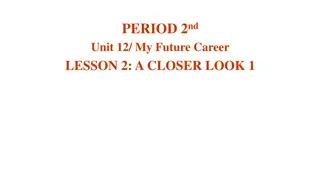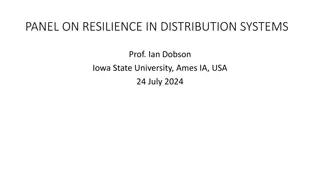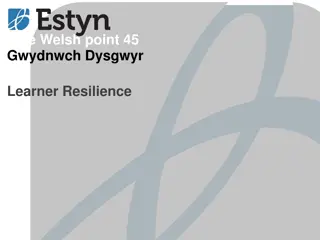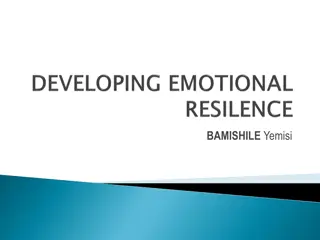Exploring Professional Resilience in Caring Professions: Strategies for Self-Care and Growth
Delve into the concept of resilience in the caring professions through reflections on personal experiences, definitions, and key concepts. Discover strategies for coping, adapting, and transforming adversity in the workplace, fostering a resilient mindset for personal and professional growth.
Download Presentation

Please find below an Image/Link to download the presentation.
The content on the website is provided AS IS for your information and personal use only. It may not be sold, licensed, or shared on other websites without obtaining consent from the author. Download presentation by click this link. If you encounter any issues during the download, it is possible that the publisher has removed the file from their server.
E N D
Presentation Transcript
Professional resilience: how we care for ourselves in the caring professions Sarah Mead 2021
Workshop plan Introduction: resilience Reflection: a resilient person Exploration: using the Resilience Framework Sarah Mead 2021
Resilience My experience: at times we are faced with very challenging life situations in person and work life (adversities), I realised that depending on the environment around me I was able to cope better (or not) with the situation and overcome it having worked in vocational rehabilitation, resilience became an ongoing exploration with my clients and patients in order to enable them to survive and thrive in the working environment. Sarah Mead 2021
Resilience - definitions Psychological resilience refers to effective coping and adaptation although faced with loss, hardship, or adversity. (Tugade & Fredrickson, 2004) Positive adaptation to adversity despite serious threats to adaptation or development . (Masten, 2001) Sarah Mead 2021
Resilience - what is it ? "Resilience is overcoming adversity, whilst also potentially subtly altering, or even dramatically transforming, (aspects of) that adversity." (Hart, A, Boing, Boing /University of Brighton, 2016) Sarah Mead 2021
Resilience - key concepts bouncing back / coping / adapting / transforming in the face of / in spite of adversity / loss / hardship Sarah Mead 2021
Resilience - perspectives 1. centred on the individual in the face of adversity or 2. having a much wider view: the individual and the environment around them in the face of adversity or 3. the individual and their environment facing and transforming adversity Sarah Mead 2021
Resilience - history Definitions: Historically ideas about resilience began by being focussed on the individual and debates about a person s innate resilience . As perspectives on disability became less based on pathology and more focused on the environment disabling the person, so too ideas about resilience began to focus on the role of the environment in supporting the individual and their development in their resilience. More recently the focus has been on the individual and groups being able to transform the adversity around them - a resilient movement Sarah Mead 2021
Resilience - ecological perspective To go further, we can talk about an ecological perspective of resilience: Ungar (2013) posits that that resilience is: an "ecological understanding of resilience suggests complexity in reciprocal person-environment interactions No news to us as OT s as we are very aware of the complex relationship between the person and the environment in everything !! Sarah Mead 2021
Ecological perspective of resilience Ungar 2013 proposes the following ideas Key terms that link to Occupational Therapy The meaningfulness of opportunities impacts directly on interactions between the individual and their environment. Meaningful occupation For me these ideas link to occupational therapy concepts of .. The environment Therefore any resilience work carried out with an individual must be meaningful for them, in order for it to have positive effects on wellbeing. There is a complexity in the relationship between the person and the environment The person - environment relationship Sarah Mead 2021
Resilience - initial reflection For 2 -3 minutes, we will take some time individually to think of someone who you feel is very resilient. The aim of this reflection is to centre ourselves on resilience. You will not be asked to share your experience or thoughts, as this is a personal reflection. However, if anyone at the end of this reflection has a particular thought they wish to share this is very welcome. Close your eyes and centre your thoughts on this person. I will give you some prompts to think about this person (next slide) Sarah Mead 2021
Resilience - initial reflection What is it that inspires you about this person in the context of resilience and adversity ? What makes them resilient ? What are their characteristics ? How do they deal with adversity ? Do they transform adversity into an opportunity somehow ? How do they do this ? Write some of your thoughts down now. Sarah Mead 2021
Resilience framework Research at University of Brighton / Boing Boing resilience community had lead to the development of a Resilience Framework that captures all the elements that contribute to developing and sustaining resilience. This framework is being used in health and care settings with adults and children. The framework (on the next slide) has also been translated into many different languages. Here is their website where you can download the framework for free and find out more about this community of practitioners and people: https://www.boingboing.org.uk Sarah Mead 2021
Resilience Framework BoingBoing, 2016, http://www.boingboing.org.uk/index.php/resources/category/9-resilience-frameworks Sarah Mead 2021
Resilience framework group reflection In break out rooms we will spend some time together thinking about our work as occupational therapists in diverse settings. We will think about the challenges of being an OT in new environments, the challenges (adversities) we face, and how we face them. We will use the elements from the central columns of the resilience framework (basics, belonging, learning, coping, core self) to stimulate ideas and discussion. We will spend 20 minutes in breakout rooms to explore the framework in the context of our practice. Then we will regroup for 15 minutes of general discussion and sharing of ideas. On the next page are the links to the framework. Sarah Mead 2021
Resilience framework group reflection What are your challenges as an OT working in a diverse setting? What do you think the challenges (adversities) are for OT s working in a diverse setting ? How can we / do we overcome these challenges (resilience) ? Link to English framework: https://www.boingboing.org.uk/wp- content/uploads/2017/02/resilience-framework-adults-2012.pdf Link to French framework / lien pour la trame fran aise: https://www.boingboing.org.uk/wp- content/uploads/2019/10/Framework-Re%CC%81silience-adults-2012-French.pdf Link to the German framework / RESILIENZMODELL https://www.boingboing.org.uk/wp-content/uploads/2017/02/resilience-framework-adults-2012-german.pdf Sarah Mead 2021
References Glibert, P, 2016, Compassion Focussed Therapy Model [accessed on 27/6/16 at: http://psychology.tools/emotional-regulation-system.html and http://compassionatemind.co.uk ] BoingBoing, Hart, Blincow and Cameron, 2016, Resilience Framework for Adults, [accessed on 27/6/16 at:http://www.boingboing.org.uk/index.php/resources/category/9-resilience- frameworks ] Masten, A, 2001, Ordinary Magic: resilience processes in development, American Psychologist, 56(3), pp 227-238 Skovolt & Trotter-Mathison, 2011, The Resilient Practiioner: burnout prevention and self- care strategies for counselors, therapists, teachers, and health professionals, 2nd Edition, Routledge Tugade, MM & Fredrickson, BL, 2004, Resilient Individuals Use Positive Emotions to Bounce Back From Negative Emotional Experiences, J Pers Soc Psychol. 2004 Feb; 86(2): 320 333. Ungar, M, (Ed) 2013, The Social Ecology of Resilience, Springer Sarah Mead 2021
